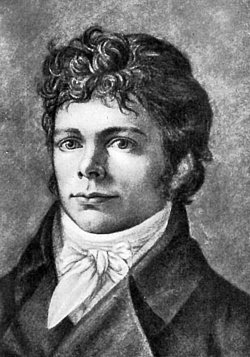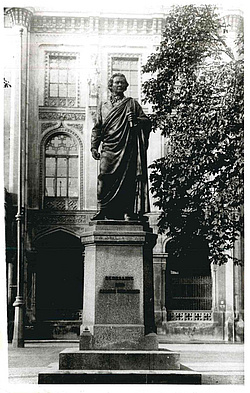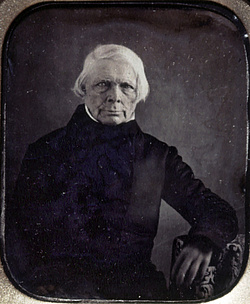Rediscovered in the 20th Century: Friedrich Wilhelm Joseph Schelling

The Comprehensive Work of Friedrich Wilhelm Joseph Schelling remained sunk into oblivion for a long time. Yet, starting in the second half of the 20th century, it has experienced an outstanding renaissance in philosophy and academic research alike, the end of which is not in sight. Until newly discovered in particular by M. Heidegger, K. Jaspers and W. Schulz, L. Pareyson und X. Tilliette, Schelling for many years was merely regarded as an intermediate stage of the classic sequence within German Idealism, Kant-Fichte-Schelling-Hegel. He was primarily considered this young mastermind whose work around 1800 had reached an early peak just to fall silent in public perception soon thereafter, being barely remembered for his following lectures about constantly renewing system designs that were leading more and more into an obscurity nobody wanted to or was able to follow any longer.
It needed a few paradigm shifts in the 20th century to revise these clichés and to rediscover a philosophy whose anthropology looks at the unconscious and the evil in man, a philosophy whose concept of nature detaches itself from a purely mechanical world view and whose last philosophy in opposition to the human reason’s claim for ultimate justification, takes into account the prior of being to which we cannot think.
Also Schelling’s reception has to be reevaluated looking past the Central European horizon: Even in his later years Schelling’s lectures were attended by a large international audience including famous names like S. Kierkegaard, F. Engels, M. A. Bakunin and J. Burckhardt. While Schelling gradually was largely forgotten in Germany, his influence in other parts of the world remained quite significant, like in Scandinavia with the brothers Ørsted, A. Oehlenschläger and N. F. S. Grundtvig, to name a few, in England with W. Wordsworth and S. T. Coleridge, in Latin-America (keyword Krausismo) and above all in Russia’s literature and philosophy, especially in the period of Russian Romanticism and in the works of W. S. Solowjew and N. A. Berdjaew.
Initiator and Pioneer
Indeed there was no philosophical school established that would have assumed and pursued Schelling’s direct legacy – in contrast to his former school day friend and later fierce opponent Hegel. The core of Schelling’s thinking seemed in his early years just too heterogeneous und incomprehensible: As a young and antagonized spokesman of German Idealism around 1800 he formed a strictly scientific transcendental philosophical system based on Fichte’s approaches, leading in the end to art and a new mythology. At the same time Schelling initiated in a close dialogue with natural sciences a Naturphilosophie whose holistic organic-evolutionary approach can be appreciated in its modernity only today. Concurrently he laid the foundation for a tradition commented on later by Peter Szondi: Since Aristotle there was a poetics of tragedy, only since Schelling there is a philosophy of the tragic. Schelling also was a close companion of Weimarer Classicism and an important initiator of Romanticism.
Adopted Home Munich

After somewhat turbulent years in Tübingen, Jena and Würzburg Schelling finally settled down in Munich. He lived and worked here between 1806-1820 and 1827-1841. He also maintained connections during his Erlangen interlude and his later years in Berlin, especially with the Bayerische Akademie der Wissenschaften (Bavarian Academy of Sciences and Humanities) as well as with the Bavarian Royal Family. As a member of the Academy of Sciences Schelling in October 1807 made his speech on »Über das Verhältnis der Bildenden Künste zur Natur« (The Relationship of the Fine Arts to Natur), which attracted considerable attention. His speech especially impressed the crown prince and later king Ludwig I. von Bayern whose lifelong affection Schelling henceforth enjoyed. Schelling was instrumental in founding the Akademie der Bildenden Künste (Academy of Fine Arts) in 1808 and became its first Secretary General. In 1827 King Ludwig I appointed Schelling professor at the new university in Munich as well as the permanent President of the Academy of Sciences and the General Curator of the Scientific Collections. Schelling also became the philosophy teacher of heir to the throne Maximilian, who would also in his later years as King Maximilian II von Bayern maintain a close exchange with his old teacher until Schelling’s death in 1854.
Teachings and Late Works

In 1809 Schelling had published the »Philosophische Untersuchunge über das Wesen der menschlichen Freiheit« (Of Human Freedom) – a work whose ethical, theological and anthropological content to this day dominates many discussions on Schelling and is still considered to not be fully sounded out. From this time on Schelling would not publish any major writings anymore, while his lecture activity increased considerably, eventually leading to last questions of philosophy’s, as a matter of fact transcending their time, inevitably resulting in being met with incomprehension by his contemporaries. Among these lectures were notably the so-called Weltalter-Philosophie (philosophy of the Ages of the World), a huge task, that had shaped especially Schelling’s first years in Munich and Erlangen. With an unprecedented radicalism the Weltalter-Philosophy tried to think and make sense of human history, its inherent reality of the evil and the possibilities of reversion.
His late work in Munich and Berlin accrues from these years as well: Here begins the fundamental distinction between the philosophy of reason and the philosophy of experience, the question of the essence of being and the factuality of existence, forced to compliment each other but never being allowed to overarch – a distinction last but not least anticipating the later existential philosophy by stating the unprethinkability of being. It is precisely this late work of Schelling that is on the one hand considered as the ultimate completion by his rediscoverers (W. Schulz) and on the other as overcoming German Idealism (M. Theunissen).
